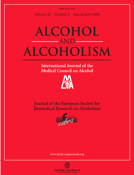 Effectiveness of Sequential Combined Treatment in Comparison with Treatment as Usual in Preventing Relapse in Alcohol Dependence
Effectiveness of Sequential Combined Treatment in Comparison with Treatment as Usual in Preventing Relapse in Alcohol DependenceAlcohol and Alcoholism Advance Access published online on October 13, 2008
The aim of this study was to compare the effectiveness of the sequential combined treatment (SCT) and treatment as usual (TU) in relapse prevention in a sample of alcohol-dependent patients, during 180 days of outpatient treatment.
The SCT approach was more effective than TU. The Kaplan–Meier abstinent proportion at the end of the 180 days was 78% for the SCT group and 59% for the TU group (P <> time to first relapse was 150 days for SCT and 123 days for TU (P <> 62% for SCT after adjustment in multiple Cox regression (P < 0.01). SCT had more MDCA (P <>P < 0.05). Therapy sessions lasted slightly longer for SCT than TU (mean 13 min versus 10 min).
SCT can result in better outcomes than TU in the outpatient treatment of alcohol dependence.
Read Full Abstract
Request Reprint E-Mail: dnetoster@gmail.com
_________________________________________________________________